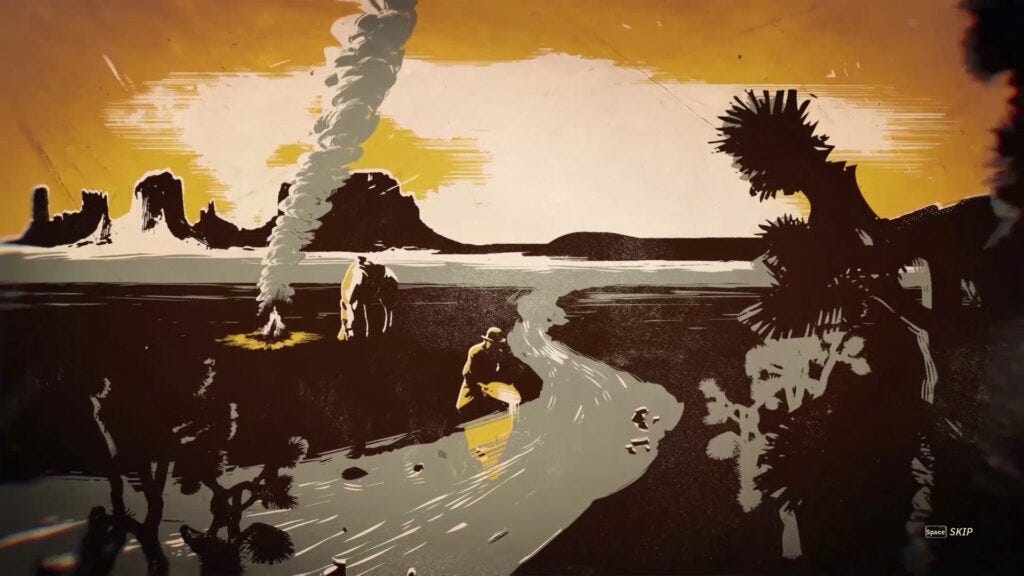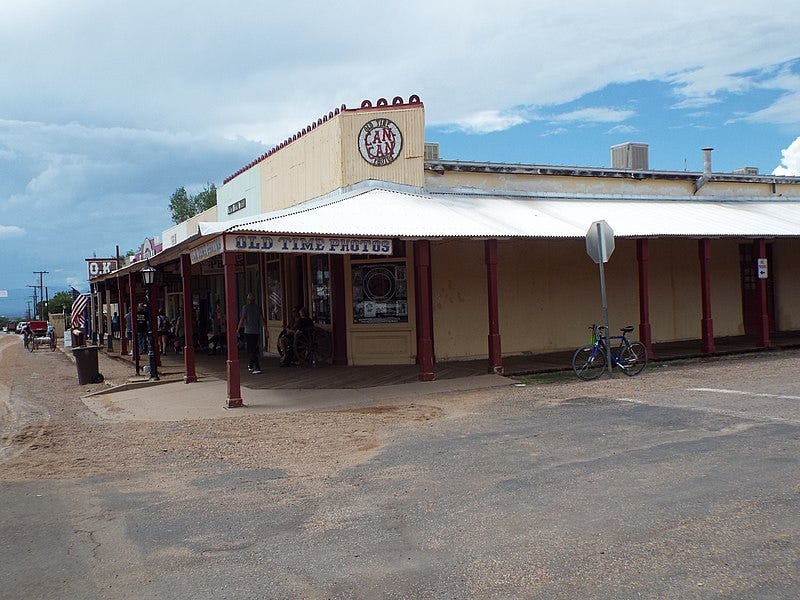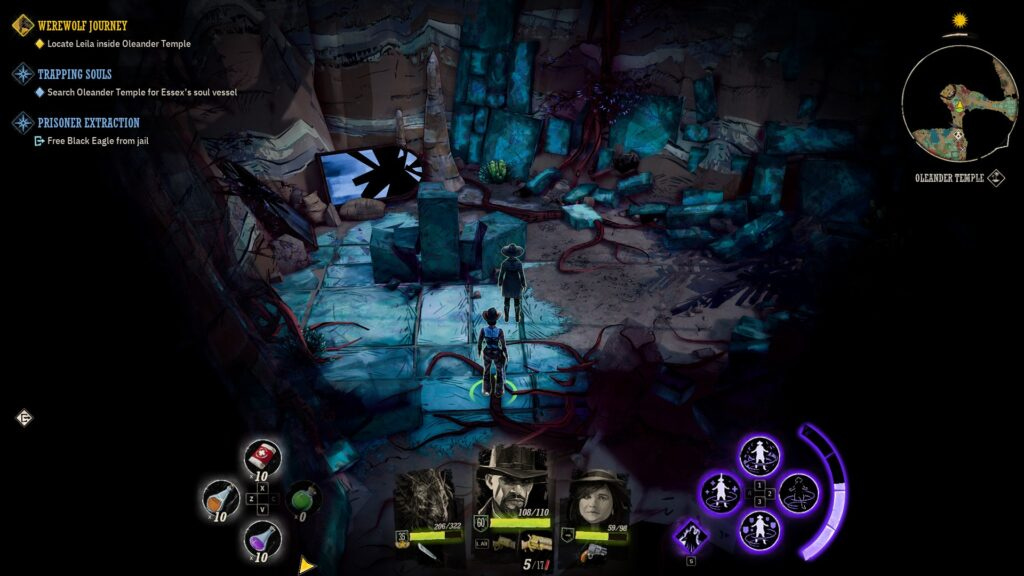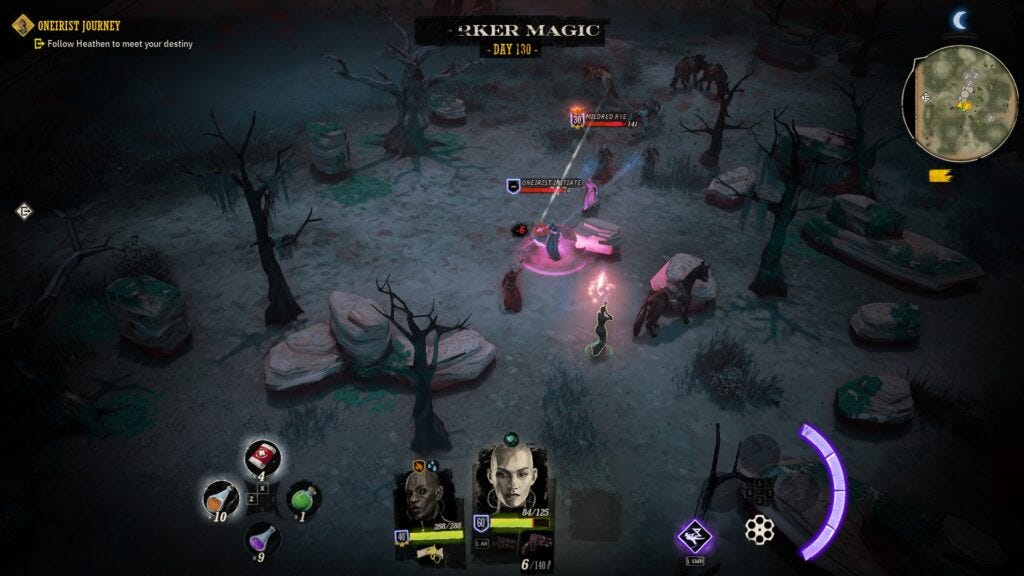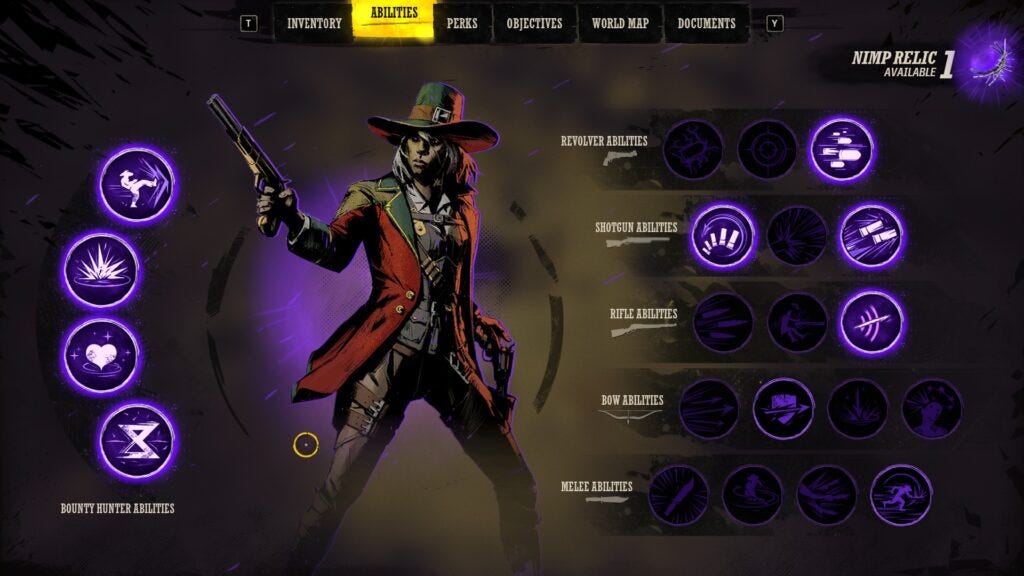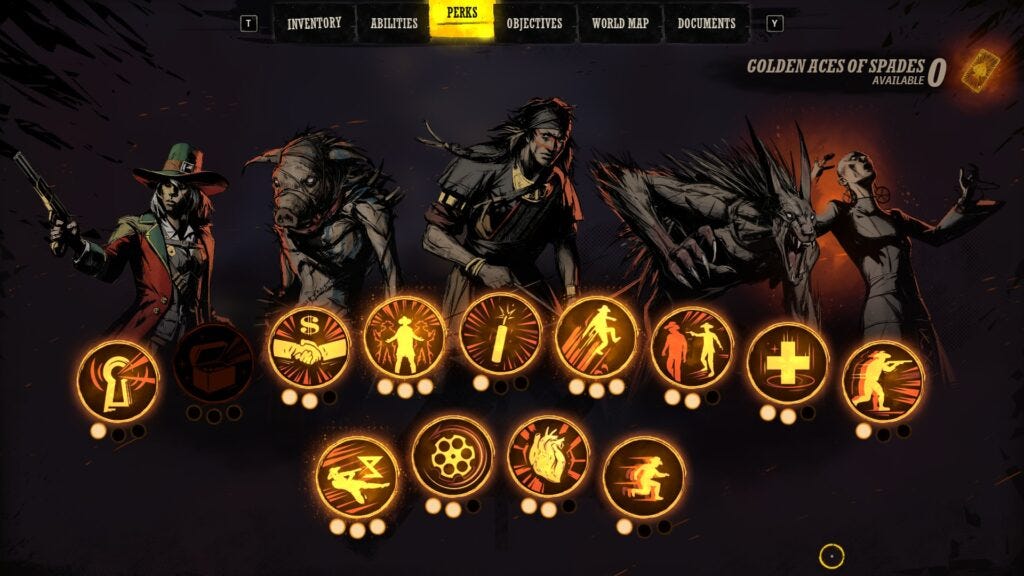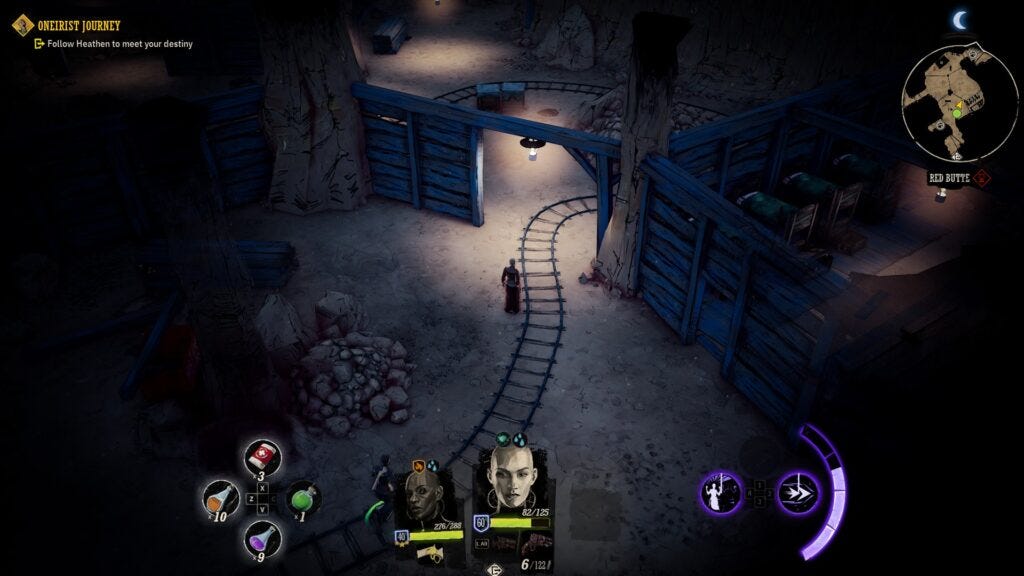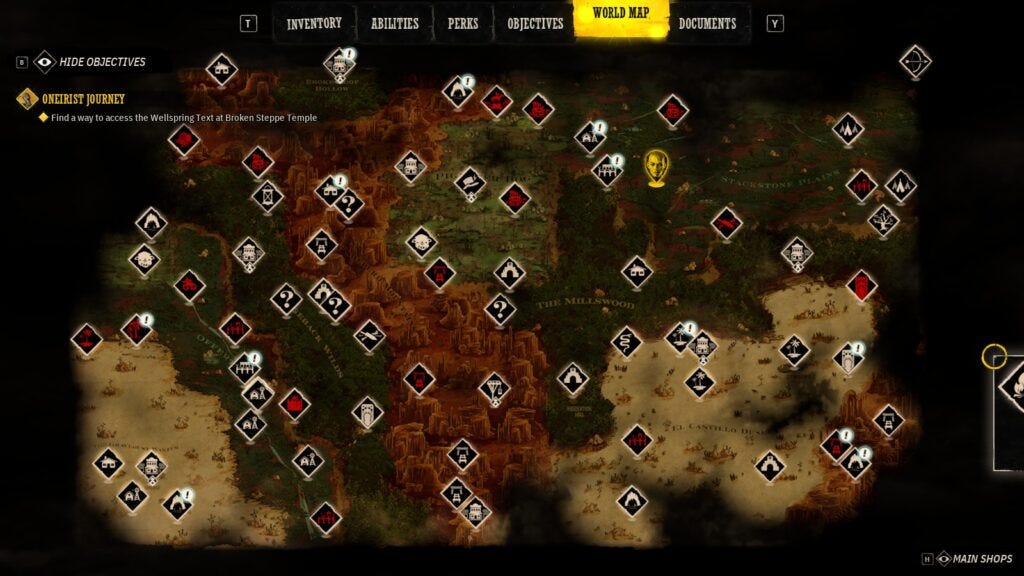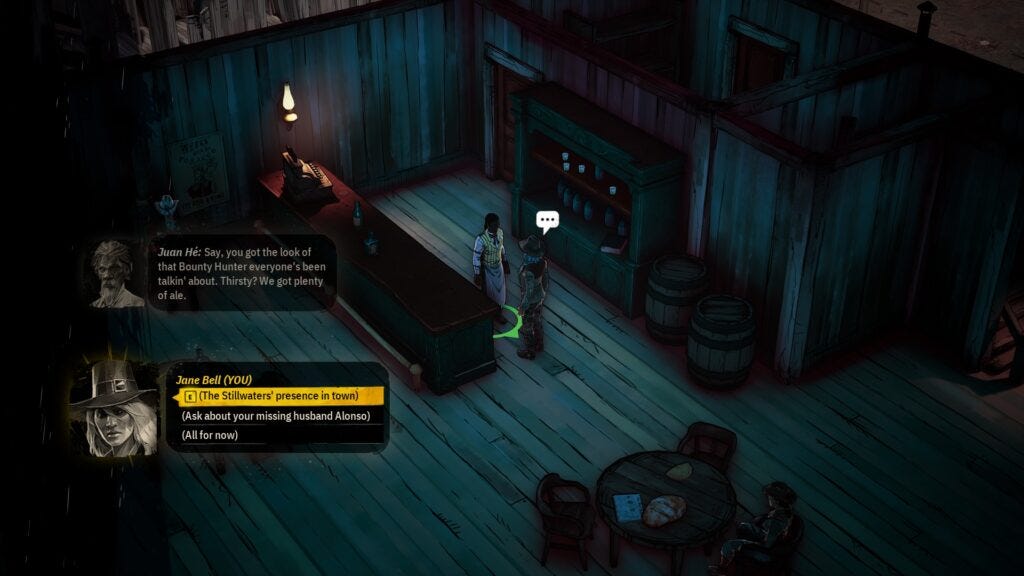Weird West Review: An Immersive Sim?
I love Westerns, I love Immersive Sims, and I love cRPGs--so why don't I love Weird West?
Raphael Colantonio is my favorite designer. Prey and Dishonored are masterpieces.
The Western is my favorite genre. Cowboys and leverguns are awesome.
Systems-driven cRPGs are my favorite games. Lack of constraint is kick ass.
So when it was announced that Colantonio was leaving Arkane to found a new studio (Wolfeye), and that their flagship game would be a Western immersive sim with cRPG elements, I shed no tears for his departure. This new project of his, Weird West, sounded exactly like the game of my childhood dreams. All of my favorite things in gaming were coalescing around Wolfeye--and delay after delay, I waited patiently still. For the end result I imagined, any wait would be worth it.
Weird West is that game. It's a Western-styled cRPG-ish ImSim with Colantonio's fingerprints all over it. It isn't something else. It checks the boxes. And when I think about that idea of a game, I still get excited at the bottom of my stomach.
So why didn't I like it? And why do I feel like Blood West does all the same things, but way, way better?
Colantonio's games don't come around very often, so I'm going to use this opportunity to perform an extensive review. Colantonio games that I dislike are even fewer and further between. You have been warned.
The Weird West: An Overview
In Weird West you play the Passenger, an enigmatic soul-hopper, as he controls five different characters from all throughout the Weird West. Each has four unique powers and his or her own storyline, as well as a shmorgishborg of side content.
With each chapter, and each new character, you're let loose on the map.
Traversal works like Fallout 2. Click somewhere on the overworld, slowly roll toward it. A horse makes the journey quicker, safer, and can double as storage, but even in the best case you're liable to encounter frequent random events while on the road. The West is no place for the safety-concerned.
When the time for gunslinging's come, Weird West is some strange mixture of Fallout, Hitman, and Dishonored, but it's most similar to Heat Signature in play. Sneak through bushes and around crates or go in guns-blazing: it's your decision. No matter your path you'll have a number of supernatural and preternatural powers to use in the pursuit of your objective. Using powers consumes Action Points, which can only be restored through rest in a bed or by drinking a mana potion. The extent of the game's similarities with Dishonored end there.
On Immersion
The territory we find ourselves in has no name other than the Weird West. This is not Earth. The game takes place in a fantasy setting. All its peoples and places are fictional. Magic is institutionalized. There's talk of settlers and colonizers, but I never received any sense of a world that exists outside this slice of the West. It's referenced a scant few times, and always there's some reason given for why so much is going down at the ass end of nowhere, but I don't know what this planet looks like more broadly. Is there a Republic somewhere? A governor? Is this a territory? Was there a Civil War? There might have been reference to all this in the newspapers, but to be honest I stopped reading them after the first few hours, because they weren't very interesting.
During gameplay, these questions don't matter. They didn't occur to me until now. But now I feel they should be posed, because I feel like this strange and surreal fantasy setting is part of what disengaged me from Weird West so entirely: for an immersive simulator, I did not find myself immersed. I didn't feel like this game had any atmosphere at all.
Weird West has most of the trappings of a Western. It has guns that look cowboy-ish. It has Stetsons and horses and saloons, and all the characters talk in exaggerated Southern accents. Yet despite these efforts, it never feels Western in the way that Blood West so effortlessly does.
I don't know if I can express why. This is one of those things you feel in your gut. But there are three major reasons I want to focus on.
Number one is music. Blood West has a beautiful, subdued, atmospheric soundtrack, reminiscent of Neil Young. Stinging electric guitars. Wind that whispers melodies into your ears. Weird West, by contrast, rarely has any score playing at all. It's conspicuous by its absence. When you do notice it, you won't notice it, because there's nothing to notice.
I don't talk about score often because I think it's literally the least important part of a game, but Westerns are different. Soundscapes are vital when you're surrounded by wide open plains or the Sonoran Desert, with no one around to talk to for miles. Red Dead Redemption and Fallout (Fallout is a Western) both nail this, especially Fallout 2. But Weird West doesn't. There's a moment in the Protector's chapter where a song with lyrics starts playing, and it's really great--one of the stand-out parts of the whole game for me. Auditory company in the West is hugely important. So where is it in this game?
I don't have an answer to that question.
Second is history. Weird West displays a West that is amazingly diverse. Chinese characters are everywhere. Black characters are everywhere. Native Americans are, ironically, not everywhere, but certainly around. There are characters with Latin-sounding names, and, of course, the dreaded Anglos, and all other manner of European.
I like this, because this is realistic. The West was a diverse place. Tombstone had a Chinese restaurant in 1887. A quarter of all cowboys were black after the Civil War, although you wouldn't know it from Hollywood. Cowboy culture originated with Mexican vaqueros! Any Western comes saddled with historical baggage, real-world baggage, that gives flavor to all these different peoples. So many cowboys were black because male ex-slaves knew how to work with animals, but had few other skills. Mexicans had been living in the recently-conquered Southwest for centuries when the Americans showed up. There's tensions from the recently concluded Civil War everywhere. Most of the Chinese immigrants are stuck here due to the Chinese Exclusion Act, most are male, and there are laws against miscegenation--so they can never legally start families.
This is all flavor for the setting. Few Westerns will focus on it, but it's there, in the background, even if the writers don't know it.
But by setting Weird West in a complete fantasy world, we lose every bit of this flavor. Instead we're left only with the bland broth of skin-deep diversity. Occasionally a character will reference some atrocity committed between two groups and we're expected to fill in the blanks with our real-world knowledge. That's about it. What does it mean to have a Latin-sounding name in the Weird West? What does that imply about a character? Where is he from? Has he faced discrimination? What's his culture like? Or am I supposed to assume he's just Mexican, as I do for the American characters, except where otherwise specified?
The Western is a complex mythological construction. When you play it straight aesthetically, the mythology is the point. You can't remove it--Manifest Destiny, Civil War, Apache raiders, the encroachment of civilization, the railroad (there's no railroad in this game at all), the immigration of the Irish and Germans--and keep the trappings, the guns and hats, and expect it to still feel Western. What we're left with when all that stuff is gone feels like a dish without calories.
You could do it, though, so long as you focused on the core dilemma of the Western: Civilization versus Wilderness, the war to tame the West. That's what Westerns are about. Not the hats, not the guns, not the Native Americans, not the Irish outlaws. Law against chaos. Order against disorder.
But that's not Weird West's focus. Weird West is about a whole lot of things, but in the end tells a story about ancient civilizations, eldritch magic, and supernatural conspiracy. Consider the below screenshot:
With the blue marble and broken mirror I swear I visited this room in Dragon Age: Inquisition. It looks elven. You will spend considerable amounts of time in ruins just like this one. It feels more like Oblivion than Red Dead Redemption. So while it looks like a Western, Weird West is really just dark fantasy with a few Western tropes thrown in.
Third and finally is the lack of voice acting. The game has a narrator; no other character is voice acted. I could live with that if Weird West were in fact a cRPG, which I believe it's trying to be, but the lack of any performance seriously hinders immersion. If I could hear the characters' accents, I'd feel like I had a much better handle on who they were and where they came from. It would breathe desperately needed life into the environments, which are often repetitive and uninteresting. Without voice acting, the whole world feels stale and fake.
On Simulation
This game has a problem with simulation. You'll regularly see loading screen tooltips more or less as follows:
"Watch out for the wind and lush foliage when setting fires, or the blaze might get out of hand."
"Notice an NPC with a new last name? Widowed characters will remarry if their spouses meet a bad end!"
"Depopulated towns will recover over time, but watch out for what...other things...move into the ruins in the mean time."
These are the three that stand out to me. In a vacuum, each of these systems sound fantastic. The problem is that if I hadn't been told about them, I wouldn't have noticed. Clearly a lot of work went into creating Weird West's world as a systems-driven environment for the player to explore. As a sandbox it's impressive on that level. But I think they may have spent too much time worrying about the last names of widows and not enough time on the actual experience of playing the game.
The second character you control is a pigman, loathed by civilization. There's a cool moment early on in his chapter where you enter into a town and everyone is hostile: you have to sneak around to get to your objective. I thought, at first, this would be a completely new way to look at the game and its environments. Like playing Nosferatu in Vampire: Bloodlines. Actually, you do a single quest, then everyone everywhere across the entire map gets the email that you're an OK guy, and you never have to worry about persecution again.
I get it. And I know it's not that simple. But how about fewer systems for town repopulation, that I never once encountered, and more systems for fleeing the porkhunters? Please?
Let's Talk About Core Systems
The primary gameplay loop of Weird West is bad. I'm not going to mince words. On the most basic level, the moment-to-moment shooting is okay, so long as you don't mind the fact that you can't aim up or down. It's preferable to GURPS. The stealth, on the other hand, is just abysmal.
This is an isometric stealth game where you cannot enter cover. That means you cannot look inside buildings if you are outside of buildings (they say you can, but it's a lie. It doesn't work). You cannot peak around corners. You cannot lean. There is a dynamic system of entering and exiting cover while aiming, which works about half the time, but it has no interaction with sneaking. You cannot go prone.
In other words, your only tools for sneaking in this game are jump, crouch walk, and roll. I'm not exaggerating when I say that the original Metal Gear Solid had more developed mechanics in 1998.
I played the first chapter on Very Hard, trying to sneak through everything as I do in every ImSim. Never again. It was a nightmarish slog. I worked out a much better strategy anyway, called, "walk through the map and kill everything point-blank with my shotgun." Doing so will require some bounty hunting, to pay for the ammo, but that'll take seconds compared to the hours you'll waste attempting to bypass guards covertly, or find alternative pathways that don't exist. Murder is more fun AND more effective!
I cannot imagine trying to sneak my way through the entire game. It would be exhausting. And I'm the guy who beat Dishonored 2 on Very Hard, on Ironman, without powers.
There are often environmental solutions to combat, such as explosive barrels or precariously placed oil lanterns or pools of water that can be electrified, but I found interacting with them--at least on harder difficulties (I turned it down to Hard after Chapter 1)--rarely worth the effort. For example I once encountered a fort with a dozen pigman goons standing in a massive lake. This seemed a brilliant opportunity to make use of my electrified bullets ability, so I activated it and tried to shoot the water--
And I couldn't, because you can only aim down if there's a target, and water isn't considered a target. I literally couldn't aim straight down at the water. Okay. Instead I retrieved a lightning grenade from my backpack and threw that; it splashed into the surface, crackling, and...a single pigman was electrified, stunned for six seconds, as a circle about one meter in radius was electrified around where my grenade landed.
Not the whole lake. Just that one spot. Because that's how electricity works.
I didn't bother with arc grenades again, and I rarely bothered with explosive or poisoned barrels. The Kurt Cobain method was easier.
What this game theoretically has going for it over other stealth games is its mystical powers. Four active abilities per character, for a total of twenty in the whole game, plus another three per gun, and four for the bow and knife. Every character shares the weapon abilities, though, so you don't need to relearn those between chapters.
Dishonored is about mastery of Blink. The other powers are flavor. With Blink you will extract infinite enjoyment out of the environments in both of those games, because the skill ceiling is high and there's always some nook you missed somewhere on some level.
The powers in Weird West are not like Blink. First off, there are way too many of them. At no point could I remember which button activated which one or, even, what they did in the first place. The first character, Jane, gets a bullet time power--but every character gets bullet time when they dodge leap anyway, so why would you ever use it? The Protector can summon a bear, which is sort of cool, except it's totally useless. The Oneirist gets an ability sort of like Blink, but you can't aim it for shit. The Werewolf can turn invisible, which is certainly good for stealth--but it's also boring. Can you think of any power less interesting in a stealth game than invisibility?
In general the character powers are useful in a niche, but challenging to remember to use. There are too many of them with effects that are too narrow, and we don't stick with the characters long enough or face tailored enough challenges to feel like their mastery is required.
The weapon abilities are a different matter. They're all shit except Sentry Silencer for the rifle. I never found a use for any of them. But again, it doesn't matter, because Sentry Silencer is the only ability you need. It's hilariously OP: it makes your rifle silenced AND do +200% damage (+300% with additional perks). Would you rather spend your mana on that, or five seconds of slow-mo?
80% of my Action Points went into Sentry Silencer. The rest went into bullet time jumping.
The game has melee combat and it's so bad that it's unusable. You won't be able to track your target while clicking on them. They 'dodge' randomly. It's terrible. So you can ignore those four powers at the bottom.
Like Dishonored there are passive perks, too, which you earn by finding golden playing cards. Abilities are purchased using Nimp relics. This means the only way to progress your characters is via exploration. No XP for murder.
That's all well and good in Dishonored, where exploration is fun. But Weird West has a big level design problem, and its systems do everything to discourage stealth whenever possible. I never wanted to explore in this game. I wanted to get on with it: do my quests, go home.
But they won't let you, because of constant random encounters. Random encounters force you into combat. You can't play a pacifist in this game. Whenever you go anywhere, you risk running into bears, outlaws, werewolves, Oneirists, and whatever else plagues the wilderness. And guess what? NPCs don't drop shit for loot. Ever. They never have Nimp heads or playing cards laying around, and they never carry weapons beyond gray quality. They never even have more than a few bucks of them, or one or two bullets.
These random encounters--the combat encounters, the ones you can't skip--add nothing. They make exploring a miserable slog. So why would I explore? I don't get anything from fighting them. In Fallout at least you get XP for killing monsters, and valuable loot. That's some incentive to engage in random encounters. Here, they're just pointless.
Plus, best case, exploration will yield loot, and loot will yield interaction with the game's inventory systems. And dear God, end my life before I see "your inventory is full" as a notification ever again. Please. I just don't want to deal with it. Weird West has some of the worst inventory mechanics I've ever seen implemented. Everything takes one slot, except ammo, which doesn't weigh anything, and XP rewards, which also don't weigh anything; stackable items don't weigh anything, except for the first item, which takes up the slot. You can only carry 48 slots at a time. No, you can't expand that with perks. Why not? I don't know. All this is in service of nothing, by the way, because there's no interesting loot anywhere in the entire game.
Exploration-based rewards made no sense for this game. It should have had a more traditional XP system. Not just for this reason, but more particularly because the environments themselves are awful.
Level Design
Colantonio's games epitomize the art of level design. I've discussed this extensively elsewhere, linked at the top of this blog. So it is with great dismay that I report I found nothing remarkable, and quite a lot tedious, in Weird West.
You're going to learn the layout of this mine entrance very well, because every mine in the Weird West shares it.
Every mine in the Weird West also has the exact same entryway:
All of them. They all look the same. Every hacienda looks the same. Every settler town looks the same. Every building looks the same. Every level is the same. It's all the same. Three or four environments, copy and pasted over and over and over and over and over again, to create a map that looks like this once fully explored:
Most of the time they don't even go through the motions of rearranging the pieces of an area in major ways. The various forts, for example, all have the same layout with almost no variation whatsoever. The towns have the order of their buildings changed, but the buildings themselves are always identical.
This is worse than a Bethesda game. One quest in the mind-numbingly ugly mine was enough for me. By the fifteenth return trip--and I'm not exaggerating--I just wanted the game to be over. I couldn't take it anymore.
The sense of sameyness between locations is amplified by the isometric perspective. I'm not in the environment. All that's changing is the art--and the art isn't even changing!
In one of the above screenshots you might notice that I specialized into the "jump super high" perks. Anyone who's played Dishonored knows the magic of getting stuck in the patrol path of a guard, flanking around to some alternate path, jumping up over a wall, and finding a secondary way into the compound you're trying to infiltrate. Verticality is the heart of the Immersive Sim. Jump height is always the first upgrade I buy in these games, especially Deus Ex and Dishonored.
There was one moment where I had this happen to me in Weird West. I flanked around the back of a corrupt mayor's house. I jumped onto his balcony, then used Sentry Silencer to break in through his back door. I picked the lock on his bedroom, stole his vault's combination, and got out without being noticed. That was classic Arkane: a systems-driven experience where I felt like my brain, and not some quest designer, solved a problem in a creative way.
That was the only moment like that in all of the game. I never once found another alternate pathway that wasn't obviously intended or clearly optimal. I hardly ever found walls so high that I needed my perk to jump up to them anyway. Once, when I finally came to a reinforced door that looked jumpoverable, I found myself stopped by an invisible wall! I had to throw a stick of dynamite instead!
Wolfeye clearly went for a quantity above quality approach with Weird West's level design. I think that was a big mistake for this kind of game. It lacks all of the magic of Arkane's titles. I'd rather be waterboarded than visit all of the locations on the map posted above: they're all identical, and every inch of the way you're going to be hounded by random events and uninteresting monsters and outlaws.
On Narrative
Almost every NPC in Weird West has a name. This is trademark Colantonio. He did the same thing in Prey, where it is a stroke of genius. In general I approve of any effort to humanize NPCs.
But it's completely pointless here. In Prey it made sense because you were trapped on a space station with a finite crew. You found audio logs and got to know each name and each voice. But the cast in this game is infinite, narratively speaking, so you're never going to be able to meet or know all of the NPCs. There's no reason to want to try.
Most characters have nothing to say. Those that can be engaged with in dialogue are few and far between, and to call what this game has dialogue 'trees' would be a vast exaggeration. Maybe dialogue twigs. Generally, an NPC will talk at you, and you get to select between one and five options. These are written ala Divinity: Original Sin, so they're parentheticals.
As for the story itself, it's just okay. The fundamental premise of the story is the end of Prey, except turned into an entire game. That's fun. There's a lot of ludonarrative consonance in that idea: the player plays the player of the characters, in the game, and it makes sense mechanically and narratively.
That's great. But what about the rest of it?
Every quest devolves into ping-ponging around the map in search of a person or a thing. You get sent between different areas by NPCs, and for the most part you won't really understand where you're going or why you're going there--you'll just know that there's a gold marker on your map and that's the next place to go.
I didn't find it very engaging. I actually like the ending a lot, it's fun--although it's just the ending of Prey, again, except it sucked in Prey but makes sense here--and the final chapter is the best part of the game from a story standpoint. Looking back, I remember a lot of individual scenes that I liked, that were cool, that stick with me. But I didn't enjoy it in the moment. In the moment, I was mostly bored and apathetic. I suspect that's because of the systems...and the world.
I've already laid out my critique of the choice to set this in a very weird West, that isn't Earth. It breeds apathy. So let me use this opportunity to talk about what I think Weird West does do well:
The dynamism of the narrative is hard to gauge after a single playthrough, but seems remarkable. The story went in the direction I wanted it to because of my decisions in the systems, not because of my choices in dialogue (for the most part). The recap screen at the end of each chapter always suggested things could have gone very differently if my play had been different. That is phenomenal game design, and it's a shame it's buried beneath so much stuff that I found so disengaging.
I also found that when the writers were more hands-on, the story improved. It was harder to be apathetic when my relationships with various NPCs was pushed to the forefront. Do I reveal the sheriff's secret, or let her live her life in peace? Do I kill my former lover, or beg for her forgiveness? Those two moments in particular have stuck with me as the highlights of the whole game.
But they're mostly confined to the primary story, and they're not enough to overcome the jank of so much of the rest of the game.
No One Has a Perfect Scorecard
The tone of this post has been very negative, but overall my feelings on Weird West are about the same as they were with Deathloop. I can't bring myself to hate it, and I enjoyed it in places, but I don't particularly like anything about it in motion. The idea, the concept, of this game is phenomenal, but the execution leaves a lot to be desired. I haven't even touched on the art, which is abysmal, and the animation quality, which is even worse. I spent the last half of my playthrough--which took about fifteen hours--focusing only on the main story, because I found no joy whatsoever in any side content.
It isn't the idea of a weird Western ImSim. That's still a great concept. It's just that Weird West isn't very good. With only more care given to the environments and more time spent on the stealth systems, it could have been an excellent game. As it is, it feels very cheap and very underbaked.
It's here I would like to draw attention toward Blood West one final time. I think it bears mentioning because it sets out to accomplish more or less the same things as Weird West on paper, and where Weird stumbles, Blood excels. It nails the Western atmosphere; it lands its narrative; it does inventory right; it perfects exploration. Blood West is, of course, a much simpler game, trying to do far less, currently only 1/3 as long (but will probably be about the same length once it's out). It's also basically linear, whereas Weird West is remarkable for its lack of linearity.
Yet the fact remains. Blood West gave me the Western horror ImSim I craved. Weird West--well, I hope it gets a sequel, and I hope they manage to improve on some of the things I've discussed here. I came away from the game feeling like I'd played a confused mishmash of different titles: Fallout meets Dishonored meets Hitman meets Heat Signature meets Wasteland meets The Elder Scrolls. When all is said and done, there's a reason why these games are different. They don't work well when blended together into a French smoothie.
This is Colantonio's worst game. It's worse than Arx Fatalis, relative to the period of its release. It doesn't hold a candle to Dishonored or Prey, and even Dark Messiah blows it out of the water. But still, I can't wait for his next one.
This review was done with a copy purchased from Steam.



